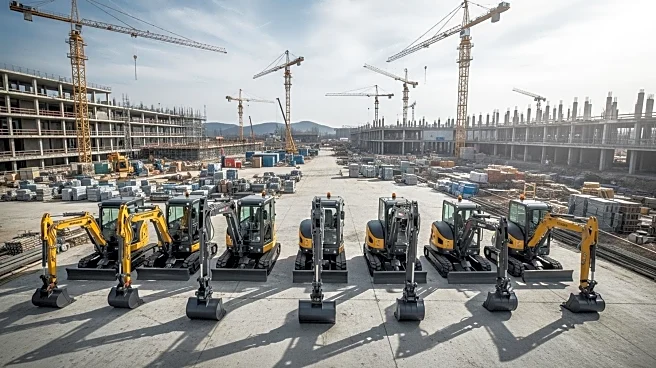What's Happening?
New Holland Construction has introduced its D-Series mini excavators, including the E42D and E50D models, marking a significant strategic shift towards vertical integration in construction equipment manufacturing. This move aims to improve performance, durability, and operator experience by bringing design and production in-house, reducing reliance on third-party suppliers. The D-Series models feature innovations such as zero tail swing, long arm options, and dual auxiliary hydraulic lines, enhancing versatility for tasks like trenching and mulching. Additionally, the Stage V-certified FPT engines and fuel-saving technologies like Eco Mode and auto idle reduce emissions and operating costs. A five-year telematics subscription offers remote diagnostics, potentially lowering maintenance expenses and downtime. This strategic shift aligns with industry trends towards supply chain resilience and technological differentiation, although its long-term financial and competitive benefits remain uncertain.
Why It's Important?
The introduction of the D-Series mini excavators is crucial for New Holland Construction as it seeks to capture growth in the mini excavator market, projected to reach $10.43 billion by 2029. Vertical integration allows New Holland to better control quality, reduce lead times, and adapt quickly to market demands, potentially mitigating risks faced by competitors like Kubota, which experienced a 22.7% revenue decline due to inventory management challenges. However, CNH Industrial, New Holland's parent company, reported a 21% year-over-year revenue decline, indicating broader market headwinds. The success of the D-Series could contribute to CNH's strategic goals of operational and quality cost improvements, aiming to expand agriculture EBIT margins to 16-17% by 2030. The challenge lies in balancing the upfront costs of in-house production with long-term benefits of margin expansion and customer loyalty.
What's Next?
New Holland plans to expand the D-Series lineup with larger sizes and advanced features, which could help compete with John Deere's diverse product portfolio and Kubota's regional expansion plans. The scalability of the D-Series is essential for New Holland to establish itself as a formidable player in the mini excavator market. Investors will be monitoring CNH's ability to execute its $550 million cost-saving plan and the adoption rate of the D-Series in key regions like North America and Asia Pacific. Success in these areas could position New Holland as a leader in the growing mini excavator market, although navigating strategic and macroeconomic challenges will be crucial.
Beyond the Headlines
The strategic shift towards vertical integration in manufacturing reflects broader industry trends and highlights the potential for operational efficiency and product innovation. However, New Holland's financial performance underscores the risks of relying solely on in-house strategies in a volatile market. The company's ability to execute its strategic business plan and achieve cost-saving goals will be critical in determining its long-term success and market position.










